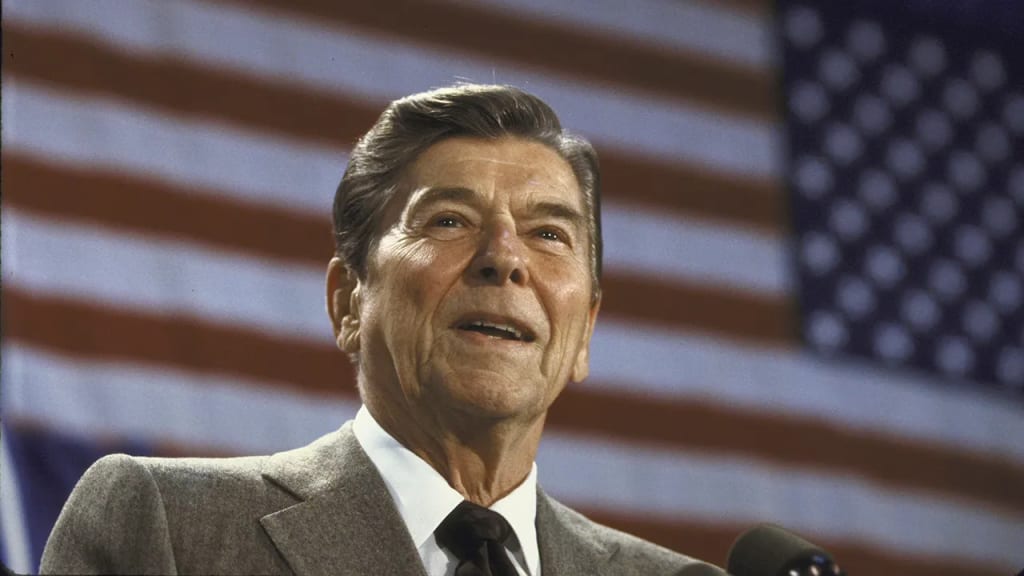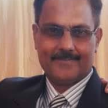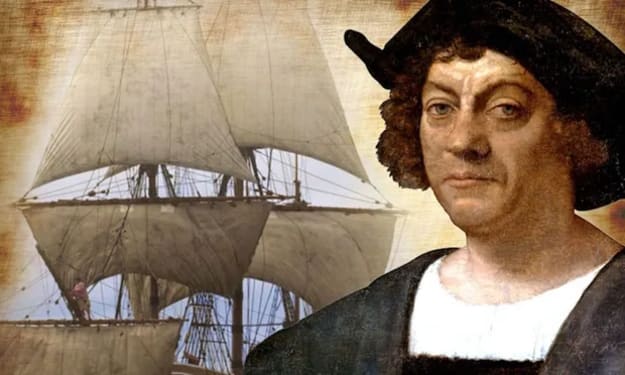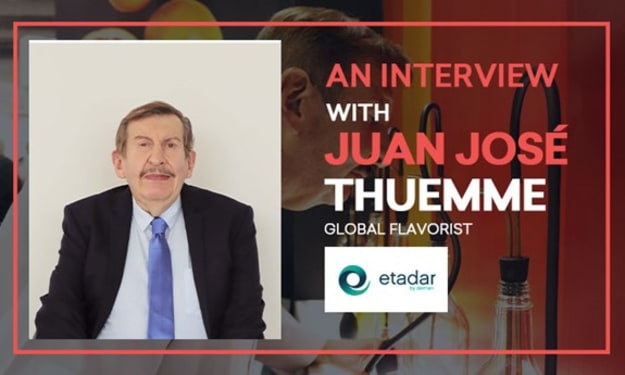An Interview with President Ronald Reagan: Reflections on his Presidency and Vision for America
Insights into the Policies, Leadership and Legacy of the 40th President of the United States

Ladies and gentlemen, it is my honor to introduce you to one of the most iconic figures in American political history - President Ronald Reagan. Serving as the 40th President of the United States from 1981 to 1989, President Reagan was a visionary leader who shaped the course of American history and transformed the country in ways that continue to impact us to this day. A staunch conservative and proponent of individual freedom and free market economics, President Reagan presided over a period of tremendous economic growth and international influence, earning him the nickname "The Great Communicator." Today, we have the privilege of hearing from President Reagan himself, as he shares his thoughts and reflections on his presidency and his vision for America. So please join me in giving a warm welcome to President Ronald Reagan.
Nadeem: Good morning! Thank you for joining us today.
Ronald Reagan: Well, it's a pleasure to be here.
Nadeem: You were known as the Great Communicator. How did you develop your communication skills?
Ronald Reagan: I think it comes down to being clear and concise. I always made sure to simplify complex ideas so that everyone could understand them. And of course, it helps to have a sense of humor too.
Nadeem: You were a successful actor before entering politics. How did your experience in Hollywood influence your political career?
Ronald Reagan: In Hollywood, you learn how to deal with people from all walks of life. You also learn the importance of teamwork and the value of a good script. Those skills were invaluable in politics as well.
Nadeem: Your policies were often criticized as being too simplistic. What would you say to those critics?
Ronald Reagan: I don't think simplifying things is a bad thing. It's important to make policies that people can understand and relate to. And if my policies were criticized for being simplistic, well, I'm in good company. Abraham Lincoln once said, "I'm a simple man with simple ideas." And sometimes, that's all you need.
Nadeem: You were known for your optimism and positive outlook. How did you maintain that in the face of adversity?
Ronald Reagan: Well, I always believed that the American people were capable of great things. And when times got tough, I would remind myself of that fact. I also found that having a strong faith and a good sense of humor helped too.
Nadeem: You famously said, "Mr. Gorbachev, tear down this wall!" How did you come up with that line, and what was the impact of that speech?
Ronald Reagan: Well, the line was actually suggested by my speechwriter. But I thought it was a great line, and it summed up what I believed about the Berlin Wall. The impact of that speech was enormous. It signaled to the world that America was not afraid to stand up to the Soviet Union, and it gave hope to the people of East Germany who were trapped behind the wall.
Nadeem: Finally, what advice would you give to young people who are interested in politics?
Ronald Reagan: My advice would be to stay true to your principles and to never give up. Politics can be a tough business, but if you believe in what you're doing, you can make a real difference. And always remember that there's nothing wrong with being optimistic. As I once said, "There are no limits to growth and human progress when men and women are free to follow their dreams."
Nadeem: You were known for your strong stance on national defense. Can you tell us about your strategy for maintaining America's military strength?
Ronald Reagan: Absolutely. I believed in a strong national defense because I knew that peace through strength was the best way to deter aggression. My strategy was to modernize our military and invest in new technology, while also building partnerships with our allies to promote global stability.
Nadeem: Your economic policies, known as Reaganomics, were criticized for favoring the wealthy. How would you respond to that criticism?
Ronald Reagan: Well, I would say that my policies were actually designed to help all Americans, not just the wealthy. By lowering taxes and reducing regulations, I aimed to create a more vibrant economy with more opportunities for everyone. And it worked. Our policies led to an era of prosperity and job creation that benefited people at all income levels.
Nadeem: Your presidency saw the end of the Cold War and the collapse of the Soviet Union. How did you feel about that historic moment?
Ronald Reagan: I felt incredibly proud of America and the West. It was a momentous achievement, and it showed the world the power of freedom and democracy. I also felt a sense of relief, knowing that the threat of nuclear war had been significantly reduced. But I knew that we couldn't rest on our laurels. We had to keep working to promote freedom and democracy around the world.
Nadeem: You were diagnosed with Alzheimer's disease later in life. How did you and your family cope with that diagnosis?
Ronald Reagan: Well, it was a difficult time, but we tried to stay positive and make the most of every moment. My wife Nancy was my rock, and she provided unwavering love and support throughout. We also focused on raising awareness about Alzheimer's disease and the need for more research and resources to fight it.
Nadeem: Finally, what legacy do you hope to leave behind?
Ronald Reagan: I hope to be remembered as a leader who loved America and believed in its people. I hope to be remembered for my optimism, my faith in freedom, and my unwavering commitment to defending America's interests at home and abroad. But most of all, I hope to be remembered as a leader who made a positive difference in the lives of millions of people.
Nadeem: Your administration was also known for its efforts to combat drug abuse. Can you tell us about your strategy for addressing the drug epidemic?
Ronald Reagan: Yes, drug abuse was a major concern during my presidency, and we took it very seriously. Our strategy was to focus on prevention, treatment, and law enforcement. We launched a national campaign to educate young people about the dangers of drugs, increased funding for drug treatment programs, and cracked down on drug trafficking and organized crime.
Nadeem: Your presidency saw a number of significant events, including the Challenger disaster and the Iran-Contra scandal. How did you navigate those difficult moments?
Ronald Reagan: Well, those were certainly challenging times, but I always tried to stay focused on the big picture. I believed in being honest and transparent with the American people, and I always took responsibility for my actions. When something went wrong, I tried to learn from it and move forward. And throughout it all, I remained optimistic and confident in America's ability to overcome adversity.
Nadeem: Your famous quote, "Government is not the solution to our problem; government is the problem," is often cited by those who advocate for smaller government. What would you say to critics who argue that government has a crucial role to play in solving societal problems?
Ronald Reagan: Well, I would say that there is a role for government in addressing certain problems, but we must be careful not to let government become too big and too powerful. As I often said, "We don't have a trillion-dollar debt because we haven't taxed enough; we have a trillion-dollar debt because we spend too much." We must always be mindful of the limits of government and the importance of individual freedom and responsibility.
Nadeem: Your presidency is often associated with the conservative movement. How do you define conservatism, and how has it evolved over the years?
Ronald Reagan: Conservatism is about preserving the values that have made America great: freedom, individual responsibility, and limited government. It's about protecting our traditions and institutions and promoting a culture of virtue and morality. Over the years, conservatism has evolved to address new challenges and opportunities, but its core principles remain the same.
Nadeem: You were also known for your close relationship with British Prime Minister Margaret Thatcher. Can you tell us about your partnership and what you admired about her?
Ronald Reagan: Yes, Margaret and I had a great working relationship and a deep personal friendship. We shared a commitment to freedom, democracy, and the rule of law, and we worked together to strengthen the special relationship between our two countries. I admired her strong leadership and her unwavering commitment to conservative principles, and I was honored to work alongside her in promoting our shared vision for the world.
Nadeem: Your presidency saw the passing of the Americans with Disabilities Act, which aimed to protect the rights of people with disabilities. Can you tell us about your support for that legislation?
Ronald Reagan: Yes, I was proud to sign the Americans with Disabilities Act into law. I believed that every American, regardless of their abilities or disabilities, should have the opportunity to participate fully in our society and our economy. The ADA was a landmark piece of legislation that helped to remove barriers and ensure equal access for all Americans, and I was honored to be a part of that effort.
Nadeem: Your "tear down this wall" speech at the Brandenburg Gate is often cited as a defining moment of your presidency. Can you tell us about the decision to make that speech, and what you hoped to achieve?
Ronald Reagan: Well, the decision to make that speech was based on my belief that the Berlin Wall was a symbol of oppression and tyranny, and that it needed to come down. I wanted to send a message to the Soviet Union and to the people of East Germany that America stood with them in their struggle for freedom and democracy. I hoped that my words would inspire people to believe that change was possible, and that they would help to hasten the day when the wall would finally come down.
Nadeem: Your presidency saw a number of advancements in technology, including the rise of personal computers and the internet. How did you envision technology shaping the future of America and the world?
Ronald Reagan: I believed that technology had the power to transform our world in profound ways. I saw the rise of personal computers and the internet as signs of a new era of innovation and creativity, and I was excited about the potential for these technologies to improve our lives and our economy. I knew that there would be challenges and risks associated with new technologies, but I was optimistic about the opportunities they presented for a brighter future.
Nadeem: Your administration was also known for its foreign policy, particularly its approach to the Soviet Union. Can you tell us about your strategy for dealing with the Soviet Union, and how you saw America's role in the world?
Ronald Reagan: Well, my approach to the Soviet Union was based on a simple principle: peace through strength. I believed that America had a responsibility to stand up for freedom and democracy around the world, and to confront aggression and tyranny wherever it existed. We pursued a policy of robust military and economic engagement, while also engaging in diplomacy and dialogue to promote peace and stability.
Nadeem: Your presidency also saw the implementation of supply-side economics, or "Reaganomics." Can you tell us about your economic philosophy, and how it shaped your policies?
Ronald Reagan: My economic philosophy was based on the idea that economic growth and prosperity come from unleashing the power of the free market, and reducing the role of government in the economy. We pursued policies like tax cuts, deregulation, and free trade, which helped to spur economic growth, create jobs, and increase prosperity for all Americans. I believed that when government gets out of the way and lets the market work, everyone benefits.
Nadeem: Your presidency also saw significant progress in the fight against HIV/AIDS. Can you tell us about your administration's response to the epidemic?
Ronald Reagan: Yes, HIV/AIDS was a major health crisis during my presidency, and we took it very seriously. We launched a national campaign to raise awareness about the disease and its causes, and we increased funding for research and treatment. We also worked to remove stigma and discrimination against those living with HIV/AIDS, and to promote compassion and understanding.
Nadeem: Your presidency saw a number of high-profile military conflicts, including the invasion of Grenada and the bombing of Libya. Can you tell us about your decision-making process when it came to military intervention?
Ronald Reagan: Well, any decision to use military force is a serious one, and we always took it very seriously. We believed that military intervention should always be a last resort, and that it should only be used when it was absolutely necessary to protect American interests and the security of our allies. We consulted with our military advisors, our allies, and Congress before making any decisions about military action, and we always tried to be as strategic and effective as possible.
Nadeem: Finally, what do you see as your legacy as President of the United States?
Ronald Reagan: Well, I hope that my legacy is one of optimism, freedom, and prosperity. I believed that America was a shining city on a hill, a beacon of hope and opportunity for people around the world, and I worked to uphold those values throughout my presidency. I hope that my policies helped to create a better future for all Americans, and that my vision for America continues to inspire future generations.
And that concludes our interview with the legendary President Ronald Reagan. We have been privileged to hear from one of the most significant leaders in American history, whose policies and vision continue to shape the country today. President Reagan's enduring legacy is a testament to his unwavering commitment to American values of freedom, democracy, and prosperity. We thank President Reagan for his time and for sharing his insights with us today. It has been an honor to speak with him, and we hope his words have provided valuable insights into his presidency and his vision for America.
About the Creator
muhammad nadeem naqvi
Naqvi is a renowned writer and journalist from lahore, Pakistan. He has written several critically acclaimed books on social issues and has been recognized with several awards and honors for his work.






Comments (1)
Learned more about his perspective on politics, communication, and his legacy. informative..🙏..show some love by reading my blogs back...thank you....